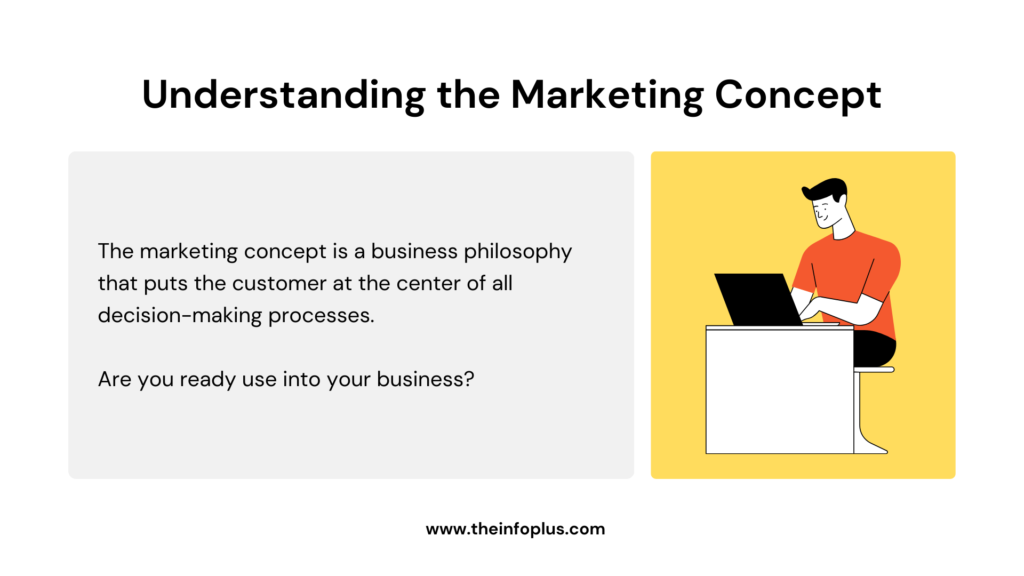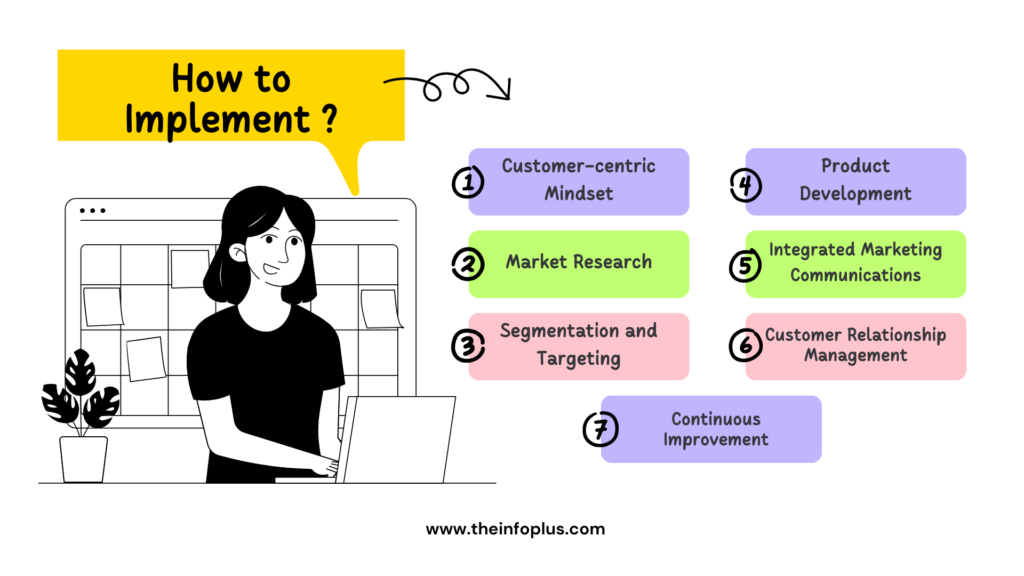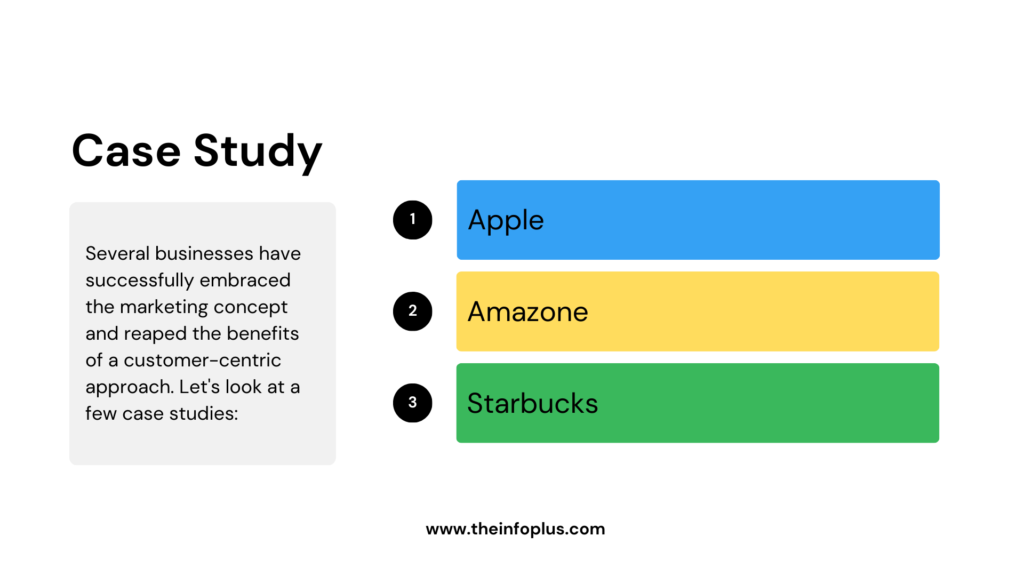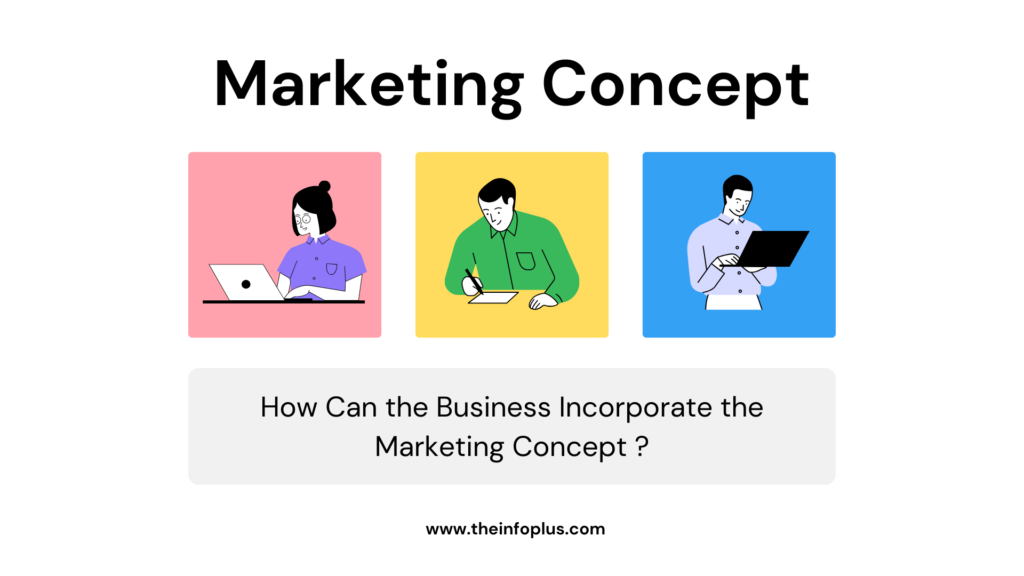Based on Theinfoplus In today’s business world, the power of marketing cannot be underestimated. It is not just about selling products or services; it is about understanding the needs and desires of consumers and creating a connection that goes beyond transactions. This is precisely what the concept of marketing aims to achieve – revolutionizing business practices and unlocking its true potential.
At its core, the marketing concept revolves around the idea that customer satisfaction should be the main focus of any organization. It requires businesses to deeply understand their target audience, anticipate their needs, and develop products or services that align with those needs. By adopting this customer-centric approach, companies can build strong brand loyalty, increase customer satisfaction, and ultimately drive growth and profitability.
In this article, we delve into the power of the marketing concept and How can the business incorporate the marketing concept. We explore the key principles behind this concept and provide practical tips on how to implement it effectively. By unlocking the power of the marketing concept, businesses can thrive in today’s competitive market and build long-lasting relationships with their customers.
- Understanding the Marketing Concept
- Evolution of Marketing Concepts throughout History
- The Importance of the marketing Concept in Today's Business Landscape
- The Impact of the Marketing concept on Business Success
- Implementing the Marketing Concept in Your Business
- Case studies of businesses that have successfully embraced the marketing concept
- Conclusion: Embracing the marketing concept for business growth
What are 5 Marketing strategies that retailers spend half of their annual budget on ?
Understanding the Marketing Concept

The marketing concept is a business philosophy that puts the customer at the center of all decision-making processes. It emphasizes the importance of understanding and fulfilling customer needs and wants in order to achieve organizational goals. This approach is in stark contrast to the production and sales concepts, which focus primarily on the company’s capabilities and products.
To truly understand the marketing concept, it is important to recognize its evolution throughout history. Over time, marketing has shifted from a product-centric approach to a customer-centric one. In the early days, businesses were primarily concerned with production and efficiency. The belief was that if a product was made well and priced competitively, it would sell itself.
However, as competition increased and consumer preferences became more diverse, companies realized the need to shift their focus to the customer. This led to the development of the marketing concept, which acknowledges that customer satisfaction is the key to long-term success. By understanding customers’ needs and desires, companies can create products and services that truly resonate with their target audience.
Evolution of Marketing Concepts throughout History

The evolution of marketing concepts can be traced back to the early 20th century. During this time, the production concept dominated business practices. Companies focused on mass production and efficiency, believing that a high volume of goods at low prices would drive sales.
However, as markets became saturated, competition increased, and consumer demands changed, businesses realized the need to shift their focus. This led to the development of the sales concept, which emphasized aggressive sales techniques and promotion to convince customers to buy their products.
While the sales concept was effective in generating short-term sales, it often failed to address the needs and wants of customers. This led to the emergence of the marketing concept, which took a more customer-centric approach. Instead of trying to convince customers to buy, the focus shifted to understanding customer needs and developing products that met those needs.
In recent years, the marketing concept has further evolved with the advent of digital technology and the rise of social media. Companies now have access to vast amounts of data and can personalize their marketing efforts to target specific customer segments. This has led to the development of the relationship marketing concept, which emphasizes building long-term relationships with customers through personalized experiences and ongoing engagement.
The Importance of the marketing Concept in Today’s Business Landscape
By adopting the marketing concept, businesses can gain a competitive edge. It allows companies to differentiate themselves by understanding their customers’ unique needs and tailoring their offerings accordingly. This not only increases customer satisfaction but also builds strong brand loyalty, leading to repeat business and positive word-of-mouth recommendations.
Furthermore, the marketing concept enables businesses to stay ahead of market trends and anticipate customer needs. By constantly monitoring market research and consumer insights, companies can identify emerging trends and adapt their strategies to meet changing customer preferences. This agility is crucial in today’s fast-paced business environment, where companies need to be proactive rather than reactive.
Finally, the marketing concept promotes a customer-focused culture within organizations. By aligning all departments and functions towards the goal of customer satisfaction, companies can create a cohesive and unified customer experience. This not only enhances customer satisfaction but also improves internal efficiencies and fosters innovation.
The Impact of the Marketing concept on Business Success
The impact of the marketing concept on business success cannot be understated. By embracing a customer-centric approach, companies can achieve several key benefits that contribute to their growth and profitability.
Firstly, the marketing concept enables businesses to identify and target their most profitable customer segments. By understanding the needs, preferences, and behaviors of different customer groups, companies can develop targeted marketing strategies that resonate with specific segments. This leads to more effective marketing campaigns, higher conversion rates, and increased customer loyalty.
Secondly, the marketing concept helps businesses build strong brand equity. By consistently delivering value and meeting customer expectations, companies can create a positive brand image that sets them apart from the competition. A strong brand not only attracts new customers but also encourages repeat purchases and referrals.
Thirdly, the marketing concept fosters innovation and continuous improvement. By constantly seeking feedback from customers and monitoring market trends, businesses can identify opportunities for product or service enhancements. This leads to a cycle of innovation, where companies are constantly striving to meet and exceed customer expectations.
Lastly, the marketing concept facilitates long-term customer relationships. By understanding customer needs and preferences, companies can provide personalized experiences and build emotional connections with their customers. This leads to increased customer loyalty, repeat business, and advocacy, all of which contribute to sustainable growth and profitability.
Implementing the Marketing Concept in Your Business

Implementing the marketing concept in your business requires a strategic and systematic approach. Here are some key principles to consider:
1. Customer-centric Mindset
To successfully adopt the micro marketing concept, it is crucial to develop a customer-centric mindset within your organization. This starts with the leadership team and permeates throughout all levels of the company. Every employee should understand the importance of customer satisfaction and be committed to delivering value to customers.
2. Market research
Market research plays a critical role in understanding customer needs and preferences. It involves gathering and analyzing data about your target audience, competitors, and industry trends. By conducting thorough market research, you can gain insights that inform your marketing strategies and product development efforts.
3. Segmentation and Targeting
Segmentation involves dividing your target market into distinct groups based on shared characteristics or needs. By segmenting your market, you can tailor your marketing efforts to specific customer segments and deliver more relevant messages. Targeting involves selecting the most attractive segments to focus your marketing resources on.
4. Product Development
The marketing concept emphasizes the importance of developing products or services that meet customer needs. This requires a deep understanding of your target audience and their pain points. By aligning your product development efforts with customer preferences, you can create offerings that truly resonate with your target market.
5. Integrated Marketing Communications
Integrated marketing communications involve coordinating all marketing activities to deliver a consistent and cohesive message to customers. This includes advertising, public relations, sales promotions, and digital marketing efforts. By integrating your marketing communications, you can create a unified brand image and reinforce key messages.
6. Customer relationship management
Building and maintaining strong customer relationships is a fundamental aspect of the marketing concept. Customer relationship management (CRM) involves implementing strategies and processes to manage interactions with customers throughout their lifecycle. This includes personalized communication, customer feedback mechanisms, and loyalty programs.
7. Continuous Improvement
The marketing concept requires a commitment to continuous improvement. This involves regularly evaluating your marketing strategies and tactics, gathering customer feedback, and making adjustments as needed. By constantly striving to improve, you can stay ahead of the competition and meet evolving customer expectations.
Implementing the marketing concept is not without its challenges. Common obstacles include resistance to change, lack of customer insights, and the need for cross-functional collaboration. However, with a clear vision, strong leadership, and a customer-centric culture, businesses can overcome these challenges and unlock the true power of the marketing concept.
Case studies of businesses that have successfully embraced the marketing concept

Several businesses have successfully embraced the marketing concept and reaped the benefits of a customer-centric approach. Let’s look at a few case studies:
1. Apple Inc.
Apple is a prime example of a company that has revolutionized business through the marketing concept. By deeply understanding its target audience, Apple has created a strong brand identity that resonates with its customers. Through continuous innovation and product development, Apple has built a loyal customer base that eagerly anticipates its new releases. Apple’s focus on customer experience and design has set it apart from its competitors and made it a market leader.
2. Amazon
Amazon is another company that has embraced the marketing concept to great success. Through its extensive use of data and analytics, Amazon understands its customers’ preferences and behavior better than anyone else. This allows the company to provide personalized recommendations, targeted advertisements, and a seamless shopping experience. Amazon’s customer-centric approach has contributed to its rapid growth and dominance in the e-commerce industry.
3. Starbucks
Starbucks is known for its customer-centric approach and focus on creating a unique experience for its customers. The company has built a strong brand that goes beyond coffee, with its stores becoming a “third place” for many people. Starbucks understands its customers’ desires for quality coffee, a cozy atmosphere, and a sense of community. By delivering on these expectations, Starbucks has built a loyal customer base and achieved global success.
These case studies demonstrate the power of the marketing concept in driving business success. By understanding their customers deeply and delivering value that goes beyond the product or service, these companies have built strong brands and fostered long-term customer relationships.
Conclusion: Embracing the marketing concept for business growth
The marketing concept has the power to revolutionize business practices and unlock the true potential of organizations. By adopting a customer-centric approach, businesses can gain a competitive edge, build strong brand loyalty, and drive growth and profitability.
To implement the marketing concept effectively, businesses need to develop a customer-centric mindset, conduct thorough market research, segment and target their audience, align product development with customer needs, integrate marketing communications, focus on customer relationship management, and commit to continuous improvement.
While implementing the marketing concept may come with challenges, businesses that successfully embrace it can achieve significant results. By understanding their customers deeply and delivering value that exceeds expectations, companies can thrive in today’s competitive market and build long-lasting relationships with their customers. The marketing concept holds the key to revolutionizing business and unlocking its true potential.

